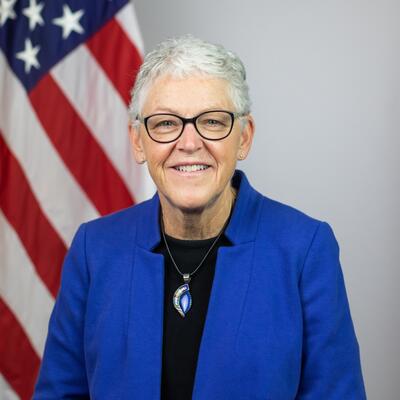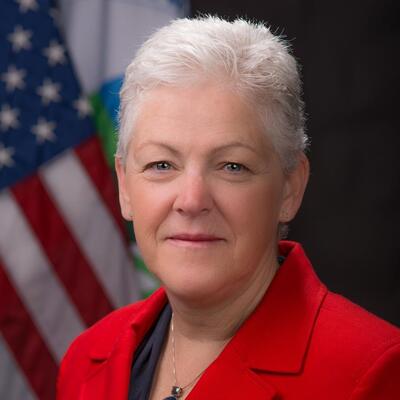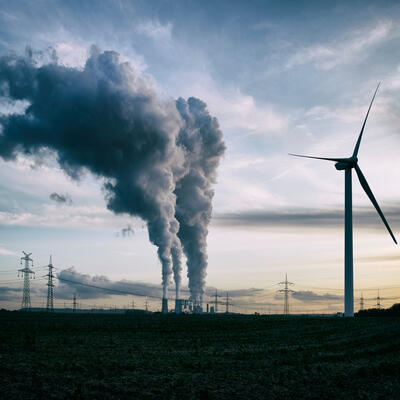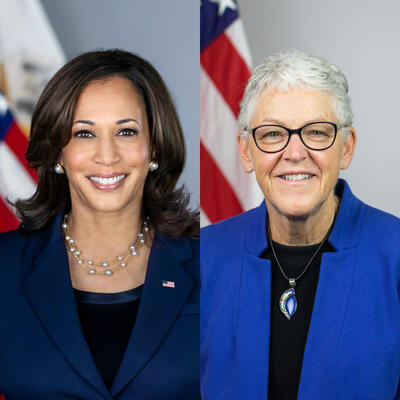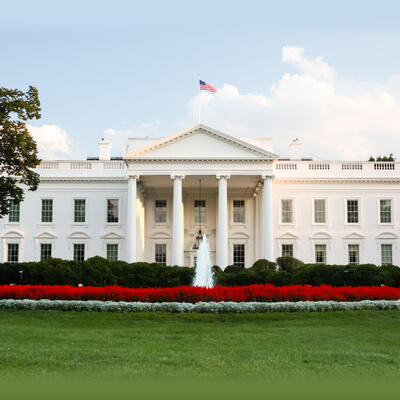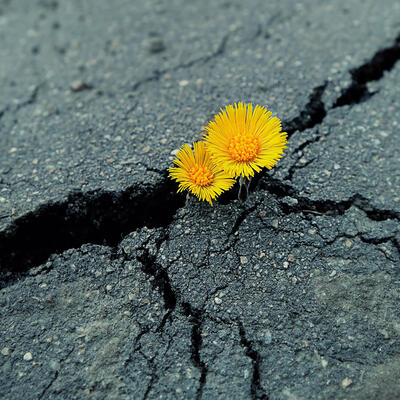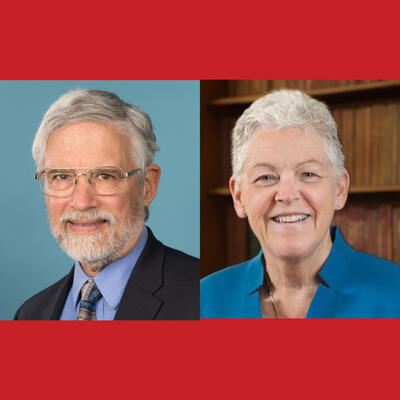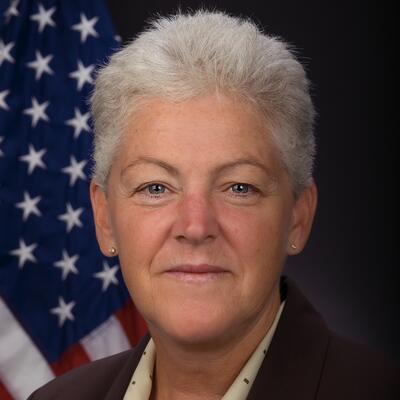
EPA Chief Gina McCarthy
Guests
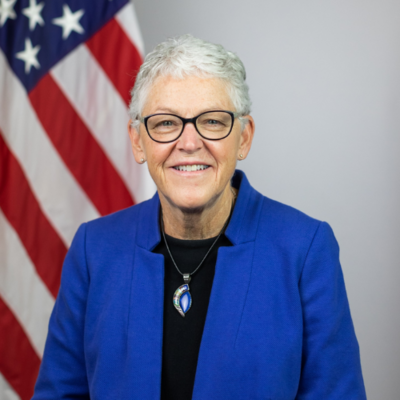
Gina McCarthy
Summary
From fisheries to food safety, California drought to Toledo tapwater, the EPA is waging the battle against climate change both domestically and globally.
Gina McCarthy, Administrator, U.S. Environmental Protection Agency
Full Transcript
Greg Dalton: I'm Greg Dalton. And today on Climate One from the Commonwealth Club, my guest is Gina McCarthy, head of the U.S. Environmental Protection Agency. Over the next hour, we will talk about growing the economy, cutting carbon pollution, fracking, the Arctic, dirty energy, hardball politics and a lot more. Our conversation will also include questions from our live audience here in San Francisco. President Obama has made cleaning up the climate a priority in his second term. A cornerstone of his agenda is a plan to reduce pollution from power plants that make people sick and fry the sky. That plan is being challenged in court and an unfriendly congress is attacking every aspect of the administration's plan to move the country to cleaner fuels.
On the other hand, the president, Republicans and large corporations are pushing a new trade deal with 12 Pacific countries. Environmentalists say that Trans-Pacific Partnership or TPP would steamroll national and local laws protecting human health and the environment. Before taking the helm at EPA in 2013, Gina McCarthy led Connecticut's Department of Environmental Protection. She also served as a top official in Massachusetts' environmental agency. For over 30 years, she worked as a state and local level on policies balancing energy, the economy and the environment. Please welcome Gina McCarthy to the Commonwealth Club.
[Applause]
Gina McCarthy: Thank you, Greg.
Greg Dalton: Administrator.
Gina McCarthy: It's good to be here.
Greg Dalton: Thank you for coming to San Francisco.
Gina McCarthy: Hi, everybody.
Greg Dalton: Climate is often talked about as a cost, as a negative thing. What's the upside in moving to a clean energy economy? What's the opportunity here?
Gina McCarthy: I think the opportunity is to take actions that turn climate, the challenge of climate change into an economic opportunity. We have solutions today that are being invested in today that really will lead to a low carbon future and make the planet a much more stable place, and give us a nice future to hand to our kids. So there's every opportunity for us to do as we've done for 44 years at EPA. Every time we have moved ahead and reduced pollution, the result has been better health, a really healthier environment and economic growth. We have never had to choose between the two. With the issue of climate, it could never be more of an opportunity to actually move to a more sustainable economy for this country and have our solutions, our technologies moved across the world. So that it's tremendous economic opportunities for us. And frankly, the choice is a very stark. If you don't want to take action, the costs are already being felt and they will get much more severe.
Greg Dalton: So the status quo has a cost. I've interviewed many corporate executives, Ford Motor Company, Walmart, a lot of big businesses are behind moving on climate change. Why isn't more being done when the evidence is clear, the science is clear, business supports, a lot of businesses support it, yet the action isn't happening?
Gina McCarthy: I think the action is happening, Greg. As much as we'd like, no. But I think that we are now seeing renewables in levels that we haven't seen before and that's because they're becoming very cost competitive. We're looking at, since this administration took office, we're looking at wind power tripling and we're looking at solar going tenfold.
Solar now is competitive with fossil fuel. I mean, we have an opportunity here. We have energy efficiency technologies we've never had before. And I think President Obama's message is that in order to figure out how we get to the levels we need in 2050, we do not have to have already charted every path or found every technology we're going to need to get there. But we know that we can make leaps and bounds by the technology innovations that we've already been able to put on the table and to make money on. There is absolutely no reason why we shouldn't take action now to take advantage of that and fully expect that the U.S. will do everything the U.S. always does, which is we innovate, we grow new companies, we find the new solution. EPA's job is to get people moving, and in our Clean Power Plan to send a long-term signal on where investment should be had. Not cost, Greg, investments should be made.
Greg Dalton: And you've been in Silicon Valley. What cool things have you seen during your trip here that might be relevant to climate change?
Gina McCarthy: Oh, I have seen lots of cool things. I'll give you a -- well, I'm here and I've seen you and Climate One is pretty cool. I mean, having you connect the dots and get to talk to everybody. But there's been cool things and there's been challenging things that I see. I certainly know that California is in the middle of a historic drought and I think -- I have Jared Blumenfeld here who is my regional administrator right here in California in Region 9, and he's been sending his troops out trying to figure out how to work with the state. But I also see some tremendous solutions. One of the things that I did that was really cool, very local, was I went to a landfill.
Now as EPA administrator, I often go, I always get to go to the best places. This has to be my two thousandth landfill visit in my 35 years doing this work. But this was one of the best because you are basically advancing a solar array that's going to really generate something in the order of six megawatts of energy. The reason why it was cool - and this is only a bureaucrat could love this so I apologize for thinking this is exciting - but it is. Basically, the county of Alameda, is that right?
Greg Dalton: Alameda.
Gina McCarthy: Alameda, thank you. Got together and they now have a bunch of government agencies that have identified an opportunity to partner together and to do a regional renewable electricity program. So they're buying it in bulk. And they've identified all kinds of government buildings and places that are contaminated or open and aren't going to be fully utilized like that landfill. And they are going to just save oodles of money by using that pooling power and get through all of the paperwork that has separated us from doing really smart things in government. I've had Jared following this and supporting it. And now we're actually going to use them as a model so that we can bring federal agencies together and do the same things. So when you have an opportunity here to basically send a signal that this is where investment needs to happen, this is where people will save money, this is the future people want, we will find ways of innovating even in the federal government, but only after everybody else does it. No, just kidding. Just kidding. Only kidding, only kidding.
Greg Dalton: The U.S. Navy is doing a lot in that area.
Gina McCarthy: Wow, it's great. Have you talked to Secretary Mabus?
Greg Dalton: We have and they're doing lots of clean fuels. He flew in a jet fighter that was half biofuels and so he's great green fleet trying to do a lot of the Navy. But what about what other countries are innovating faster? Is there a possibility that U.S. could lose its innovation edge in the clean energy race?
Gina McCarthy: I think it is possible because you're seeing a lot of investment being made now in Europe and Asia on new technology improvements for renewable energy. But I do think that the U.S. has an edge in this race if we keep moving it forward because I think we have an incredible opportunity. And as you said, we have multinational companies that are headquartered in the U.S. that are already saying, "Hey, let's think about this differently. Let's stop dwelling on how bad it could be and let's start moving the actions forward." And we have a program that many of you probably know. If the polling is correct, eight out of ten of you should know. Did you ever see Energy Star? You see that little blue label on all the appliances? Guess what that is? It's a greenhouse gas label because it's all about energy efficiency. It was started as a greenhouse gas program. We just forgot to talk about it for quite a few years that way. Now we are.
There's 1,600 partners with us on Energy Star, driving new technologies into the market that are saving people huge amounts of money and lowering the greenhouse gas emissions by huge amounts. This is just -- we have opportunities here. We are geared up for it. We know how to work markets. We know how to make money. I think what government just has to do is set standards like we always had for pollution. What's healthy? What do we need to achieve? What kind of timeline should we look at? And then the rest just happens because I think we have both the government structure of seriousness. We actually do very thoughtful rules and we actually enforce them which is always very good as well. And so once you do that, the market just generate solutions because the market is created there.
And with carbon, we've all worried about how do you get a price on carbon? How do you make it serious enough that it gets integrated into business decisions? And businesses are integrating it now. And so we can do this and we can have the edge that we actually need to get into Paris and really make a difference.
Greg Dalton: And another institution that's also integrating it is the Vatican. The Catholic Church has a covenant on climate. There's been a lot of talk recently about Pope Francis and what he's doing. How do you see that changing the debate and framing this as a moral issue?
Gina McCarthy: Well, I think the president was pretty clear when he gave his speech a few years ago, saying that he was moving on climate using the authority that's been given to him. And that's when he charged EPA to go work on the power sector and work on heavy-duty vehicles and do the work we do. But it's been a remarkable change. When you talk about this as a moral obligation, when you point out the direct public health impacts and indirect associated with climate change, when you talk about it, when the president's economic advisers and [Treasury Secretary] Jack Lew talked about it as an economic challenge, people get it.
And the Pope is actually being very aggressive in calling attention to this issue and its relationship with an inclusive economy. I actually went to Rome to meet with his advisers, not too long ago, because I knew that he was working on an encyclical. Now I can't say that I've read or participated in writing many of those, so I wasn't telling him how to do that, but I wanted him to know that he's not alone in recognizing that this is a moral challenge. And I wanted him to know that the big countries, the big polluters, like the United States and China, are making real commitments now.
And then the great thing about this is, the end result is a world that is not just healthier and more stable, but it's also a world where you're growing jobs of the future that you can train people to have now that are jobs that are going to last. And we have an ability, at this point, to really bring technologies to the table that will raise people out of poverty, give them an opportunity to be in the middle class. In the U.S., that's what we're focusing on. It's just not good enough to segregate these issues into who has bureaucratic control over what. The president says, we’re going to use this to actually climb ladders of opportunity for people and we're going to invest in technologies that will drive that forward. And I'm just, as you can tell, pretty excited and pretty bullish on our ability at this point to finally get over the hump and start moving forward, and making the right choices and taking the right action, and getting very serious.
Greg Dalton: If you're just joining us, our guest today at the Climate One of the Commonwealth Club is U.S. EPA administrator Gina McCarthy. I'm Greg Dalton. Thirty percent of Congress are Catholics, do you think that the Pope encyclical could do something that President Obama couldn't, which is change the politics on this issue?
Gina McCarthy: I think they're a great dynamic duo. I want them to both do whatever the authorities are.
Greg Dalton: Batman and Superman, there you go.
Gina McCarthy: I have to say that I am Catholic so I may be overestimating his influence. On me he's pretty influential. But I think around the world it's quite amazing. He does a blog. He blogs and tweets and all those kinds of things. And I had a great time when I went to the Vatican to talk to them about the Pope's interest in this. And they were very clear that it is a very strongly held belief that he has that this is the absolute right thing to do and that this is a moral issue. It is about poverty. It is about taking care of the least of these. And we work with a variety of a faith leaders, not just in the Catholic faith, but across all faiths. It's an ecumenical movement and there are many people that see this as being an essential issue, an essential moral issue that the faith community needs to engage in, and they're very engaged in this. And I think that that gives us new voices at the table to talk to people who maybe have not understood or embraced the issue of climate change from leaders that they will listen to. It's enormously important that this be a very multifaceted discussion among all cultural sectors, all religions. Because in this country and I think across the world, we're hoping that people will drive this, not politicians. This is about people.
Greg Dalton: Care for creation is a common theme across a lot of religious traditions. Climate is a moral issue. A lot of people were upset recently when the president approved drilling in the Arctic, so help us understand drilling in the Arctic.
Gina McCarthy: Yeah. I think that it's very challenging. And I think what you read about was not an approval, it was a permit. I know that's a bit of a distinction, but those facilities, those leases went out a long time ago. And I think the challenge that we have had in issuing air permits and others are now having is to make sure that it can be done safely. The decision was not made to open it; the decision was made to try to make it as protective as possible as it moves forward. But there are all kinds of challenges; this is never going to be easy. It's never going to be snap your fingers and everybody lines up, and we figure out how to do this. It's going to be a struggle and there will be difficult decisions all along the way.
Greg Dalton: Because it seems like saying it's a moral issue, but then “all of the above” energy policy is kind of trying to have it both ways, or say it's moral but avoid some really hard choices.
Gina McCarthy: I think hard choices are being made. I think the president's job is to make sure that we do this in a way that is deliberate, but maintains opportunities for the market to make choices. But what he's trying to do is to make sure that carbon has a price on its head and that we look for every opportunity we can. We've done it with every pollutant. The issue with carbon is, it's really no different than any other pollutant out there and we have to just send the right signals and the rest happens. If you don't think the energy world is already moving away from fossil to lower carbon sources, then you haven't watched where the energy world is investing its money, because it is.
Now that doesn't mean that there aren't opportunities for every fuel and that we have to work through those issues, and time will make that transition even more dramatic. But I think my job is to make sure that I am doing what we did with every air pollutant before. We are reducing it significantly, making people healthier and growing the economy at the same time. And it's a delicate balance, in some cases, but certainly I think in the issue of moving towards a low carbon future, the balance is already tipped and we are already heading there. The question is how quickly and who's going to win?
Greg Dalton: And how are low oil prices affecting this? Some people would say low oil prices means, "Hey, I can buy an SUV. Oil is cheaper." On the same side, another side, it keeps the tar sands in the ground, it makes some of the oil in economically or environmentally sensitive areas uneconomic. So is cheap oil working for you or against you?
Gina McCarthy: That's a really good question. I think that, in some cases, you certainly have to worry about it. When we do things like ACCA rules, I'm very happy it wasn't just a fuel economy standard, it was a greenhouse gas standard so that we can make sure that we underpin any additional omissions that may have been omitted if people are running their cars more. Those are all challenging issues.
But frankly, I've had a lot of discussion with the oil and gas sector recently because there's a lot of discussion about reducing methane from the oil and gas sector. And as you may know, we're going out with our Clean Power Plan for the power plants, but we're also going to be going out to regulate methane emissions and volatile organic carbons from the oil and gas sector. And what I see is that the oil prices being low is causing the industry to regroup and to rethink. And I think you're going to see diversification. I think that they're really worried about relying on just one fuel and you're going to see a lot of transition and you're going to see a lot of more efficiency brought into that system. How dramatic that happens I don't know. But they are taking it as a pause, and they are looking at the work that we're doing which is looking at basically telling them they need to recapture methane as really efficiency measures that they can begin to get their arms around.
Greg Dalton: Also, the idea of unburnable carbon and carbon bubble starting to really gain traction in Wall Street and move to the fringe. I've mentioned the Trans-Pacific Partnership. Sander Levin, who is the ranking member on the House Ways and Means Committee, says there needs to be stronger environmental provisions. Are you satisfied with the environmental protections in TPP?
Gina McCarthy: Well, the additional environmental protections in TPP are really quite remarkable. They're remarkable for, if you care about the sustainability of fish in the ocean, it is the first time that that is a front and center issue, to look at sustainable fisheries. If you're worried about wildlife trafficking, that's the first time that that is going to be accounted. These are issues that I think are increasingly important, but I respect everybody's discussion about this but I think the president is right, we need to move forward to try to address these issues.
There is nothing directly within EPA's jurisdiction that's impacted by this. It's not additional pollution standards but it is, I think, important from the standpoint of all of my sister agencies. And if you care about a sustainable future, you have to start doing more to make sure that fisheries are protected. And if you care about biodiversity and if you care about kids feeling good about their world and learning and knowing that elephants existed and you want them to continue, if we can't do better with that type of trafficking issues, then I don't know what we're going to do. We're going to have a much less rich world than we grew up in.
Greg Dalton: Protecting the environment has not always been so partisan and I want to roll a clip of someone who was here recently. This is George Shultz who was the former Secretary of State and former Secretary of Treasury in the Nixon administration when the EPA was created. So let's listen to George Shultz talking about the EPA. Hello, George.
[Clip]
George Shultz: So I had them creating the EPA and I watched it over the years, and it seems to me it has proven itself as a very useful nag to keep after us, and we have better, cleaner air, cleaner water. You would much rather breathe the air in any American city than breathe it in Beijing. Thank you, EPA.
[End Clip]
Greg Dalton: So there's a love note from George Shultz. Where are those days where people -- there's a Republican talking about the EPA. Could we get back to a place where the environment is not a partisan issue?
Gina McCarthy: I think for most people, it isn't which is why I like getting out of Washington D.C. because it reminds me of that and not just in California. I mean, people are concerned about this. He reminds me of one of the really fun things that I've done is I went to Beijing. When was I there? Last year? And it was right after the U.S. Embassy.
We worked with the U.S. Embassy to put a particulate monitor on the embassy, and we did it for the embassy staff. But they started tweeting out the results because people were worried about whether their kids were safe being outside that worked in the embassy. And that's U.S. soil so we put a monitor up. We trained them on how to analyze the data and we work with them on it. And all of a sudden, that data became available to the entire city. And people started getting very anxious about the fact that we were showing levels of PM and they were markedly different than the monitors that the Chinese government was reporting on.
Greg Dalton: Shocking, yes.
Gina McCarthy: Yeah, I know. But the really interesting part about that and I know that we've been working in China for a long time, working with them on air quality issues. But when I was there, I came in right afterwards and they turned from “you really have to take that monitor down” to realizing that it was extremely important for their ability to be able to tell their citizenry in Beijing that they were working on this. Because it got to be a social issue there for them. It escalated in terms of its importance. And all of a sudden -- I'm sorry, this was a few years ago, because when I came back last year, they had a new whole entire monitoring system in Beijing up and running. We taught them how to manage it and they have now a whole series of new analyzers there in Beijing and all of them are U.S. companies, have manufactured those.
And the fun thing is that we made a recent announcement with Secretary Kerry that we're going to do the same thing in other cities like in India. We're going to put them on our embassies. And people are going to start seeing what the data is because there's so much power in citizenry to be able to speak up and be able to articulate and move in their own countries on this. And I think, again, I may be overestimating the power of this, but when we went, and the president was negotiating with China on a new joint announcement to really put defined goals on the table for carbon reductions, we put ours on the table. But for the first time, China talked about limiting their carbon pollution, not just an intensity goal which most of us were floored by because --
Greg Dalton: Coal.
Gina McCarthy: -- we wouldn't have thought that this would happen. And I honestly -- we spent a long time talking to them about, "You now know you have an air pollution problem, you've got to fix it. Would you mind thinking about that in concert with a carbon strategy? Because they go hand-in-hand." When we go after the carbon pollution in our power sector, what you're going to see is gigantic general public health benefits, just because you're getting some of the old fossil fuel units out that pump other pollutants like particulate matter into the air. And I think they're realizing that the way in which the U.S. has been able to grow our economy as strong as it is and have a healthy environment at the same time is the only stability that they really can rely on.
If you don't start thinking about the environment as a foundation of a growing economy, you're going to end up where Beijing ended which is people don't want to live there. People are wearing masks every day. It's the kind of haze that you used to see in Los Angeles, only worse, and they're not going to stand for it. And so if you really think of it together, there's opportunities here and I think they really have begun to realize this. Why are we going to take care of particulate matter and not think about carbon pollution?
Greg Dalton: And that's a game changer in many ways. China's move puts pressure on India, puts pressure on Canada. It also takes away the argument of “what we do doesn't matter because China and India are going to fry the earth anyway.” So how has that changed the political dynamics because now China has put their cards on the table as you said?
Gina McCarthy: It changes the international dynamics tremendously. I'll never forget. When we announced our proposed Clean Power Plan, my dance card was filled up by international people coming in. Ambassadors from everywhere, different secretaries saying, "Can you really do this?" And I kept saying, "Yes, this is a Clean Air Act, we know how to do this one." And it hasn't stopped. And I think that when we made that commitment, the president was confident that he could deliver real domestic action here. We found how to do that. He has a whole plan, not just what EPA is doing, but we're doing many other things as are other parts of the administration. And when he went to China, he was able to leverage the Chinese action and I think that that is going to change the dynamics. And the U.S. wants to go into Paris having already worked with other countries to try to get them on board and get really strong commitment so we finally have an international solution to what we know is a planetary problem.
Greg Dalton: Right. And it seems to be the countries are putting their plans out in public earlier this time around. So what's your hope for, what's going to happen in Paris? What's the likely outcome of a deal in Paris?
Gina McCarthy: I think we want to have an aggressive and a durable agreement, and we want to be able to make sure that we move that forward.
Greg Dalton: Does it have to go through Congress?
Gina McCarthy: No. No, no.
Greg Dalton: Well, the --
Gina McCarthy: There's many other ways and they're already working on many ways in which we can do this simply under our current authority, and we think and we know that we can do it in a way that's strong enough and that will assure us that these actions are going to be taken, not just in the U.S., but across other countries.
Greg Dalton: Another area where the president is trying to use that executive authority is with the Clean Air Act and the Clean Power Plan in the United States. That's been challenged in the courts, we'll see some decisions. His former mentor Laurence Tribe said it's unconstitutional. Is it?
Gina McCarthy: No.
Greg Dalton: But that seems to be odd that there is a House version of the Clean Air Act and the Senate version, they're different. There's maybe a little too much scotch going around back there, like with the 1990s, where like there's two different versions. No one seems to know which one.
Gina McCarthy: Yeah, this happens with very long bills, that is, inconsistencies in certain portions and they're right, there is a little difference in language. But the courts have always given the deference to the agencies to interpret these, looking at the Congressional record and looking at what makes sense. And so we have been using an interpretation that has been perfectly well -- found perfectly reasonable in the courts, and it's the same interpretation we're using here. There is nothing that says that if I regulate mercury in one section of the Clean Air Act, then I'm banned from regulating carbon in other sections of the Clean Air Act. It just would be foolish.
Greg Dalton: So you're confident you're going to win on that one.
Gina McCarthy: Oh yeah, I think. Well, of course, I think they're all a slam dunk because we're really smart and we know everything we're talking about. But we've made the case and we'll make the case going in. And lawyers love to pontificate about these things and I just love to get stuff done.
Greg Dalton: If you're just joining us, our guest at Climate One of the Commonwealth Club is Gina McCarthy, administrator of the U.S. EPA. You can join the conversation on Twitter using our handle @climateone.
I'd like to go to our lightning round, a series of yes or no questions.
Gina McCarthy: Oh, the Congress tries to do this to me and I don't ever respond appropriately. So I just want to warn you, I have trouble with yes or nos.
Greg Dalton: You're not under oath and so --
Gina McCarthy: Good. You can't make me, that's all I'm telling you.
Greg Dalton: Do not now recollect, yes.
Gina McCarthy: I do not now, nor have I ever.
Greg Dalton: Environmentalist self-righteousness can be annoying and counterproductive?
Gina McCarthy: Well, that's a yes.
Greg Dalton: Okay. You are sick and tired of the Keystone Pipeline?
Gina McCarthy: Oh, absolutely.
Greg Dalton: Approval of the Keystone Pipeline would be a disaster for the climate?
Gina McCarthy: I can’t answer no to that. I can’t answer yes to that. All I know is, it's a difficult decision, but it's not the only decision.
Greg Dalton: Is he ever going to make that decision?
Gina McCarthy: I sure hope so. Yes, of course. Of course, of course.
Greg Dalton: If North Korea, Iran or Syria were responsible for climate change, Republicans would be clamoring to fund a war on warming.
Gina McCarthy: Should we start that rumor and see what happens?
Greg Dalton: I'm just -- yeah, so that's a yes. Mitt Romney, your former boss --
Gina McCarthy: Yes.
Greg Dalton: -- understands how climate change threatens America's economy and national security.
Gina McCarthy: He certainly -- can I give you a longer answer? Because I did work for him and actually we put out a climate action plan which I helped to draft when he was governor.
Greg Dalton: You were the green quarterback.
Gina McCarthy: I was for a little while. I believe he knows that the work that you can do, the actions you can take on climate, can be enormously economically beneficial, and he embraced every single one of them. That's what I know and so that's all I can tell you. What his position is on climate change right now, I can't tell you. I don't know.
Greg Dalton: He knows there's money to be made but --
Gina McCarthy: Oh, he does know, yeah.
Greg Dalton: This is the last yes or no question for our lightning round. More members of Congress are in the climate closet than the gay closet.
Gina McCarthy: All I know is that's a big closet and it's full. That's all I know.
[Applause]
Greg Dalton: Okay. We'll leave it to your imagination there for Gina McCarthy. Water is a big deal. We often talk about climate. How is the drought connected to climate? It's a big thing here in California, the American West. The West was built on the back of snowpack that is going away.
Gina McCarthy: I know, I know. I think we've all known that water is where it's at first with climate. There's plenty of evidence that it's been in other countries the reason for wars to be fought. And it's a major concern, not just droughts but floods. And that's the dynamic that's so difficult to explain to people who aren’t enmeshed in the climate science. They figure, if you got a downpour, you're all set. It doesn't mean there's a drought, but it's serious business. One of the parts of the president's climate action plan is he laid it out in three different ways. One is we have to take action to reduce the amount of carbon pollution because that's mitigation, but we have to spend a considerable amount of time working with states and communities on adaptation, what we call resilience.
Gina McCarthy: We have to.
Greg Dalton: Boston is going to be --
Gina McCarthy: I had the worst winter of my life this year and we were so happy that -- I live in Boston but I work in Washington. We were just rooting to beat that record because we felt like it was the worst miserable winter. We got more snow constantly than with Everest received, so we were all dancing when we beat that record because it gave us something. Who wants to fall two inches short of the worst? So we can't say, "It's the worst." We want to say it's the worst. What was your question?
Greg Dalton: I don't know. I'm just thinking about --
Gina McCarthy: Oh, drought, drought, right.
Greg Dalton: -- going to the bar --
Gina McCarthy: Yeah, yeah, I get it.
Greg Dalton: -- and I'm thinking about, yeah.
Gina McCarthy: Yeah, it was the worst. But I was actually in Kansas last year and half the state was in a drought and the other half was flooded. It's just amazing what's happening. And we are working really hard to understand the broad implications of the drought.
Greg Dalton: So how do you explain to someone who says, "It snowed, so global warming is not happening?" Or these extremes, hotter, wetter, dryer, is that related to climate?
Gina McCarthy: Well, we keep explaining to them that it's about extreme weather events, it's about weather events that we normally have, but they're just going to be worse. I mean, there's no easier way to explain that. And the issues related to drought, Greg, go well beyond what's happening in our wells for drinking water which is extremely concerning, especially to tribes in this area frankly and in many communities now. They just don't have drinking water supplies and that's certainly not just limited to California. It's getting very extreme. But one of the things we're thinking about is it matters for all of the infrastructure that's in place today to deal with storm water, what do you do with the floods that you have? All of our calculations on how much pollutants can go into a stream and keep it healthy for fisheries and swimming and drinking, all that is going to change if you don't have the flows anymore.
It's not that we want to rely on that but we do. And so everything changes for EPA. That's why every federal agency has gone through an adaptation plan to look at all the tools we have in place, all the decisions we make, what gets changed in the changing climate, whether it's because of the floods or because of the drought. But water is where people are going to feel it and see it most which is one of the reasons why EPA is shoring up the jurisdiction of the Clean Water Act by finalizing a rule that says, "What's the jurisdiction of the Clean Water Act?"
Now I know that most people would think that if you have a statute that's 43 years old, we might have decided this already. Not the case. It's gotten very confusing through different court actions. But this is our ability to protect the water that we have, never mind how little we might have.
Greg Dalton: And people are also concerned about their food. The World Health Organization recently said that glyphosate - did I say that right?
Gina McCarthy: Glyphosate, yeah.
Greg Dalton: Which is an ingredient in Roundup, in a major weed killer, is probably carcinogenic. What's EPA going do about that?
Gina McCarthy: Well, EPA is in the middle of doing a new assessment of glyphosate and we're going to be finalizing that soon. I think we do the best job we can on the science and the risks. All of these issues with pesticide is very challenging. That one, in particular, is challenging. It's so broadly used and it's used in so many ways. So EPA has a couple of choices. We look at the risks associated with all new pesticides and we look at when things change and we try to periodically look at them as well. But we also have to look at whether or not there are management systems that you could put in place that will allow those pesticides to be used appropriately.
And we're also looking -- it gets more difficult because we're looking at how to control drift. We're looking at genetically modified seeds that are basically married with the use of glyphosate as well. So there's increasing challenges for EPA that go well beyond what Schultz might have anticipated when we were firstborn.
Greg Dalton: And a lot of that drives --
Gina McCarthy: And it's quite challenging.
Greg Dalton: A lot of that drives king corn that this country has kind of gone pretty deep into corn, that's pulled back a little bit recently. If you look at food security and changing the food system, does corn's role need to change?
Gina McCarthy: Yeah. I think that, again, I can't answer the question. What I know is that agriculture is constantly changing. We were just talking relative to food security. This is another conversation I actually had at the Vatican with folks who are working in other countries to look at how to get people out of poverty and change the structure of agriculture for them. I think it's very challenging in this country, agriculture at this point. They are working. They're a sector that's most impacted by drought and by floods. They are looking at new techniques and new technology to try to work their way through those things.
But every time that corn prices go up, people like to talk about basically renewable fuels and what impact that's had on prices go up. And then you go and talk to others and you go in Iowa and they like it. You go in a chicken farm community, they don't like it. I mean, it's all over the block. Some people think it's great, some people don't. I think EPA's job is to make sure that we work with agriculture so they can keep producing products. But my job is to make sure that the water stays clean, that the air stays healthy and that we work with them as best as we can on the choices that they're making.
Greg Dalton: If you're just joining us, our guest today at Climate One of the Commonwealth Club is Gina McCarthy, administrator of the U.S. EPA. I'm Greg Dalton.
[Climate One Minute]
Announcer: And now, here’s a Climate One Minute.
Texas Governor Rick Perry was our guest in 2014. While he agreed that government has a role to play in protecting the environment, Perry was concerned that too much regulation could get in the way of progress.
Rick Perry: I just think we’ve allowed our government to get so big, so cumbersome, so layered, that it’s lost in too many areas its focus and its ability to be efficient.
There are really two questions out there. One is, you know, is the climate changing? If the climate’s changing, why is it changing? And if man’s engagement is the reason it’s occurring, then we need to have the solutions to that. And my great concern is that policies that are put in place in Washington D.C. that can strangle the economy of this country, jeopardize our ability to innovate.
And I think that’s the bigger question, not fighting amongst ourselves or trying to push people off into corners, but to recognize that America and America’s innovation, both the private sector working with the public sector, and coming up with the answers to these great challenges that we have relative to the environment. That’s our role and we cannot do it if we strangle our economy, if we put our economy at jeopardy.
Announcer: That was Rick Perry, former governor of Texas, speaking with Climate One in 2014. Now, back to Greg Dalton and his guest, EPA chief Gina McCarthy, at the Commonwealth Club.
[End Climate One Minute]
Greg Dalton: We have some students in the audience and I'd like you to sort of think about them. And what you say to them about their future and what our generation is doing to steward the resources for them.
Gina McCarthy: I think kids are great. I'd like to keep them around. That's my first message.
Greg Dalton: Okay.
Gina McCarthy: I think one of the things that's amazing -- and I should tell you. I had a couple of other really cool visits while I was here. I got to go over their Facebook and that was really interesting to see their new building in the work, how buildings look that attract young vibrant kids out of college. They don't look like EPA buildings, that's the first thing I'm going to say, although I thought they were really cool and we're getting better. We're getting better. But I also went to Google. And one of the great things about kids is how much information they have that's available to them, and how much they can learn and how active they are. I can't tell you the number of schools I've gone where kids know a whole lot more than most of the people that I talked to in - I shouldn't say in Washington - anywhere.
Greg Dalton: Should we just hand over the keys to them?
Gina McCarthy: I think that would actually be a really good idea. I think after being in Google and Facebook, we actually have done that because everybody is a kid to me these days and it gets worse and worse every year. But they're incredibly active, they're bright, they're willing to face challenges. I spent a little bit of time in Taiwan at a school where those kids were working with partner schools - I think it was in New Jersey, a school in New Jersey - to exchange information on how to reduce carbon pollution from the schools.
It was an unbelievable opportunity for me to see how bright and engaged kids are. They really are the future. If we set a course that is right for them, then they will run. And I know that there's lots of kids here in the audience, some of them are going to other countries to visit, like India, we can learn from one another. But what was so fascinating with both Google and Facebook is how much information they have available that can get out to kids. EPA has a big emphasis now on citizen science because I think we do need to get people more engaged in sciences, more able to access data without that being filtered by anybody, including the Environmental Protection Agency. Go at it. Go see it.
We're developing technologies that are allowing people to understand what their local stream quality is, what their local air quality is and getting it out. Because when people have information, it is power. We said that, I said that in the 60s. I say it today only it's amazing. And when we saw the demonstration of Google Earth Engine, being able to look and see about land changes and changes in water and changes associated with different types of activities that we regulate, it's just an amazing information that's going to be at their fingertips. And the world is going to be theirs to shape at some point in time. My hope is that we hand them one that where it's not quite so challenging.
Greg Dalton: And where we can be proud of.
Gina McCarthy: Yeah.
Greg Dalton: We're talking with U.S. EPA Administrator Gina McCarthy at Climate One. Let's have our audience question. Welcome.
Female Participant: Thank you. So this question is coming from the perspective of a 16-year-old interested in going into public policy, born and raised in the Bay Area. What message do you think, like the most single short message that we should be sending out about the California drought?
Gina McCarthy: The single message is that it is directly related to a changing climate and that everybody needs to be part of the solution. Everybody.
Greg Dalton: Thank you for that question. Let's have our next audience question for Administrator McCarthy.
Female Participant: Thank you. You've talked a lot about what the EPA is doing to address greenhouse gas emissions, to address climate change, but I'm wondering if you could talk a little bit about what the EPA is doing to address what's often referred to as climate change's evil twin - ocean acidification.
Gina McCarthy: Yeah. Its evil twin, I like that. Actually, this is a favorite subject matter of Secretary Kerry. He is a big oceans person. We had a big oceans conference last year that he pulled together. And EPA is very active in this, and Jared probably wants to jump up and down because he's kind of an oceans person too. He's done a lot of work on this. Ocean acidification is the one issue that the IPCC is just beginning to get. I'm sorry.
Greg Dalton: The UN climate scientists. That's fine.
Gina McCarthy: Thank you. Is just beginning -- he's told me no acronyms and here I am acronyming. Is that a word? Basically, ocean acidification is the one issue that I think we're beginning to really see the dangers associated with ocean acidification. It wasn't clear until fairly recently that people began to focus on the science. I was out in Washington not long ago and all of the Washington oyster beds are now moving to Hawaii, and it's because of the temperature and the acidification. It could be extraordinarily concerning as you're looking at the science. EPA is working on those. The lead in the U.S. government is NOAA, the National Oceanographic --
Greg Dalton: Atmospheric Administration.
Gina McCarthy: Atmospheric Administration. I say the acronyms, I forget what it stands for. And we're working with it, with them and with others on this. But it is very disconcerting and you're absolutely right. It's a factor, a climate factor, which I don't think we've yet gotten our arms around or understood its full implications, but its impacts are being felt.
Greg Dalton: One implication is the coral reef dies. That's the bottom of the food chain for a lot of subsistence people in developing countries that could have some real serious consequences. Let's go to our next question.
Female Participant: Hello. I'm a big fan of the Clean Water Act, as many of us are, I'm sure. And I'm interested to understand the impact it can have on the agriculture community. And so I've been watching the lawsuit in Iowa about suing upstream nitrate. I'm wondering how much EPA is watching that lawsuit and the implications for larger Clean Water Act.
Gina McCarthy: Yeah. Well, I'm a fan of the Clean Water Act too. Thank you. And I think we’re all a fan of safe drinking water, so that's why I like it, right? Its impact on agriculture, we are getting ready to finalize the clean water rule, which is going to be a really big opportunity for us. I think what impact it will have on agriculture is to make sure they can still do their jobs, but we can still deliver safe drinking water. That's what this is all about. I think agriculture has raised some concerns about it. I think when we said potato, they said potato. We said half-full, they said half-empty, so we're going to be extraordinarily clear about what we're doing with our clean water rule. We are going to be able to write it in a way that continues to protect the exemptions that they enjoy that allow them to do normal farming and ranching activities, but we're going to be very clear about what water is absolutely necessary to protect. So that if you're planning to pollute it or degrade it in some way, you have to get a permit or at least ask about whether mitigation is necessary. And I don't think that's too much to ask and I don't think it conflicts in any way with agriculture continuing to do its business.
Now you asked about the Iowa lawsuit. This is all about basically a nutrients that are being emitted and Iowa, in particular, is something where the Des Moines water company is basically saying they have to treat water considerably more than they would otherwise, and charge their customers for it as a result of what they are saying are nutrients that are being put into their upstream waters that are ending up coming to their water system. And so there are a variety of lawsuits happening. But honestly, we are, I think, working as hard as we can with USDA and agriculture to find opportunities for reductions in nutrient pollution. They know that they have a responsibility to be a good steward of the environment. And I think if we can continue with this partnership and bring science to the table, then I think we'll be able to resolve these issues in a way that allows them to do their business while everybody else can enjoy the clean water that we all have as a right.
Greg Dalton: Let's have our next question.
Male Participant: Hi. So the U.S. federal government -- there's large quantities of fossil fuel production on U.S. federal land currently, including in the Powder Basin in Wyoming and the land --
Gina McCarthy: Powder River Basin, yup.
Male Participant: -- all over the place. And the federal government, this is an area where the administration has struck authority and the federal government is effectively subsidizing fossil fuels by allowing expansion of coal production on these areas. So is the administration going to curtail coal production and other fossil fuel production in these areas as part of meeting its climate goals?
Gina McCarthy: Yeah. So it's one of the ongoing challenges is to figure out how we can sort of take advantage of the minerals that the United States government owns, but make sure that if they are developed and used that we do it in a safe and responsible way. I think there's a lot of discussions going on about how to manage those choices effectively, but on the other end of the spectrum, we know we have responsibilities to actually manage our lands effectively, and those choices are going to be continued to be made and we're going to let science drive it.
But we are also going to know that if we are burning coal, there are technologies available to actually make that the most efficient and clean way that we possibly can. But you're absolutely right, there’s minerals to be had on federal lands, there’s a lot of mining operations. I think the Department of the Interior is doing the best job they can to make sure that that development is done safe and responsibly, but there is a balance that needs to be made here.
Greg Dalton: We're talking about the environment with U.S. EPA Administrator Gina McCarthy at Climate One. I'm Greg Dalton.
Female Participant: Just last year, Lake Erie had some big issues --
Gina McCarthy: Oh yeah.
Female Participant: -- contaminating the drinking water in Toledo. And I'd like to know how will the EPA be moving forward, addressing pollution from CAFOs, the concentrated animal feeding operations and other types of agriculture to prevent this from happening in the future?
Gina McCarthy: Well, I think I can talk again. This is good. So that everybody is on the same playing field. This is about the Western Lake Erie which is very shallow and it has what you call harmful algal blooms which are really creepy algae that grows. Actually, creepy algae growths are everywhere, much more than they used to be. In this particular area, it's surrounded by agriculture and there is no question that nutrient pollution is impacting that, but it's also an issue of the temperature of that water getting much warmer.
So it's a climate issue as well. So we're seeing these harmful algal blooms popping up in more places. And I spent some time with the mayors in -- actually, we gathered in Chicago around there because a harmful algal bloom had actually shut down the drinking water supply in the city of Toledo for four days. It cost multimillions of dollars and it's because the harmful algal blooms actually produce these what they call cyanotoxins which are very powerful toxins that if they get in your drinking water, you don't want to be drinking it.
And so we actually have a multipronged approach to this issue. Part of it includes working with agriculture and figuring out how we reduce the nutrient loading that's going in that may be contributing to it, but it's not the only issue and it's not happening only in Western Lake Erie. So we have really a cross federal agency effort, not just to work with agriculture and to work with USDA on conservation practices and getting buffers in and our ability to address that, but we are doing really cool stuff with new technologies to monitor harmful algal blooms so that you can see when they may be impacting a water supply or about to.
EPA put a platform on the space station to figure out whether we could monitor water quality to be able to track harmful algal blooms by looking at basically -- I'm never going to explain this because I'm not good at this. But you shoot light down and you see what it looks like when it comes back at you. You look at light fractions and you see if you can measure turbidity in the water which is a way to track harmful algal blooms and it actually worked.
And so we work with NOAA and with NASA, and we actually have a whole tracking system where we can, on a daily basis, see where these things are so that we can inform water managers, water treatment managers, every day about whether any harmful algal blooms are approaching so they can make decisions about their water intakes and whether to shut them off or not.
So there's lots of things going on that relate to what's causing the problem, but also recognizing that in a changing climate, these things are happening and will keep happening and we have to hit you science and technology to track it and prevent it from leading to health consequences. So there's lots of fun things going on at EPA and across the federal government.
Greg Dalton: Let's have our next question for Administrator McCarthy.
Female Participant: Hi. We've talked a lot about water today and the drought and the importance of clean drinking water. And so I wanted to get your perspective and including the EPA's and the president's thoughts around fracking. And it's a really huge issue right now and on the one hand I understand that it's helping to increase our domestic oil production but on the other hand, we've seen reports of it causing earthquakes and there's obvious signs that it's impacting our drinking water. So I was just curious as to what your thoughts on that was?
Gina McCarthy: Boy, you asked a really big question. EPA is working on this issue in a number of different ways. Let's just stick with water quality issues because we could hit the earthquake issue as well. But the water quality issue is something that Congress actually asked EPA to look at and we have been doing that for a few years. And we have only a short period of time for you to see our draft assessment report on this. Basically, they told us to look at the whole water cycle and where hydrofracking -- everybody knows what hydrofracking is? Where hydrofracking can impact or potentially impact water supplies, potential water supplies as well. And we have done a series of about 18 different research projects to be able to answer that question about where the vulnerabilities are as you hydrofrack in terms of their ability to impact. And we're going to hopefully be able to provide that information in a way which points in the direction of how you can use existing technologies and best management practices to address those potential problem sites.
Greg Dalton: We have to wrap up. I'd like to end by asking you, what is your carbon vice?
Gina McCarthy: Well, my carbon vice is I really enjoy going home so I fly a lot. I'm sorry but I love my children and my husband, and I'm not sorry about that.
Greg Dalton: We have to end it there. Our thanks to Gina McCarthy, administrator of the U.S. EPA. I'm Greg Dalton. Let's thank Gina McCarthy for her comments here today at Climate One of the Commonwealth Club.
[Applause]
[END]
